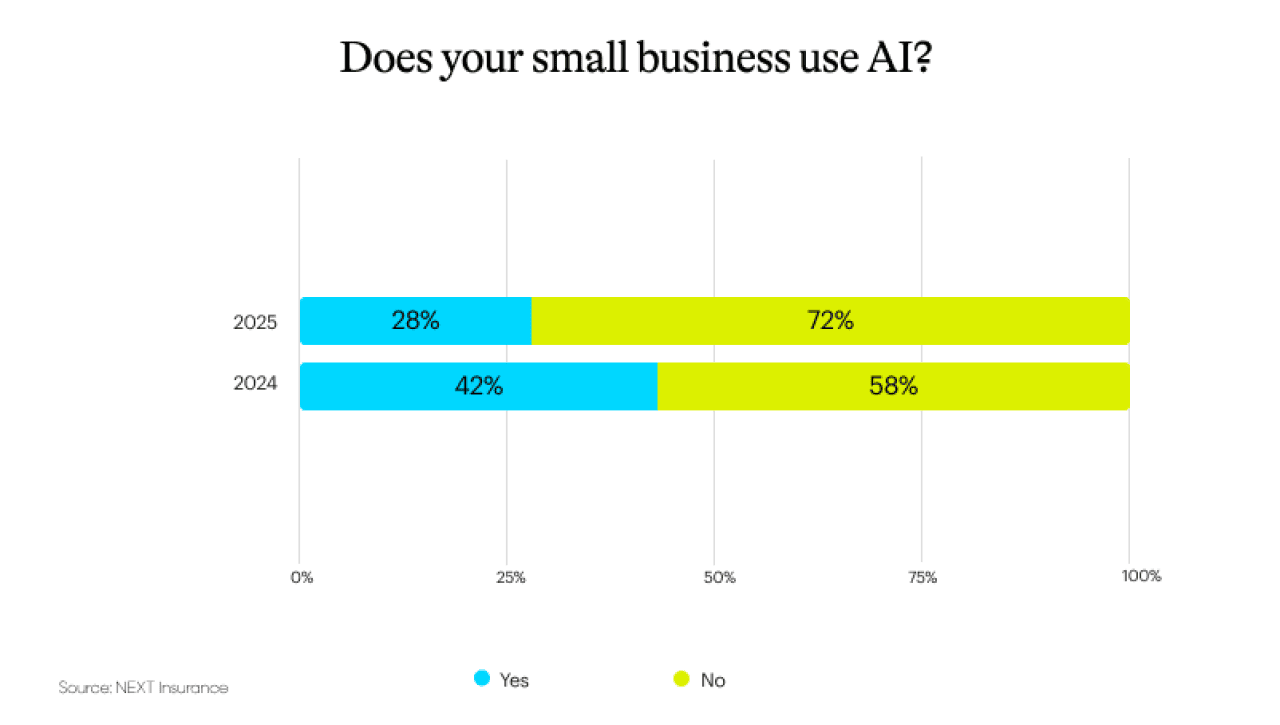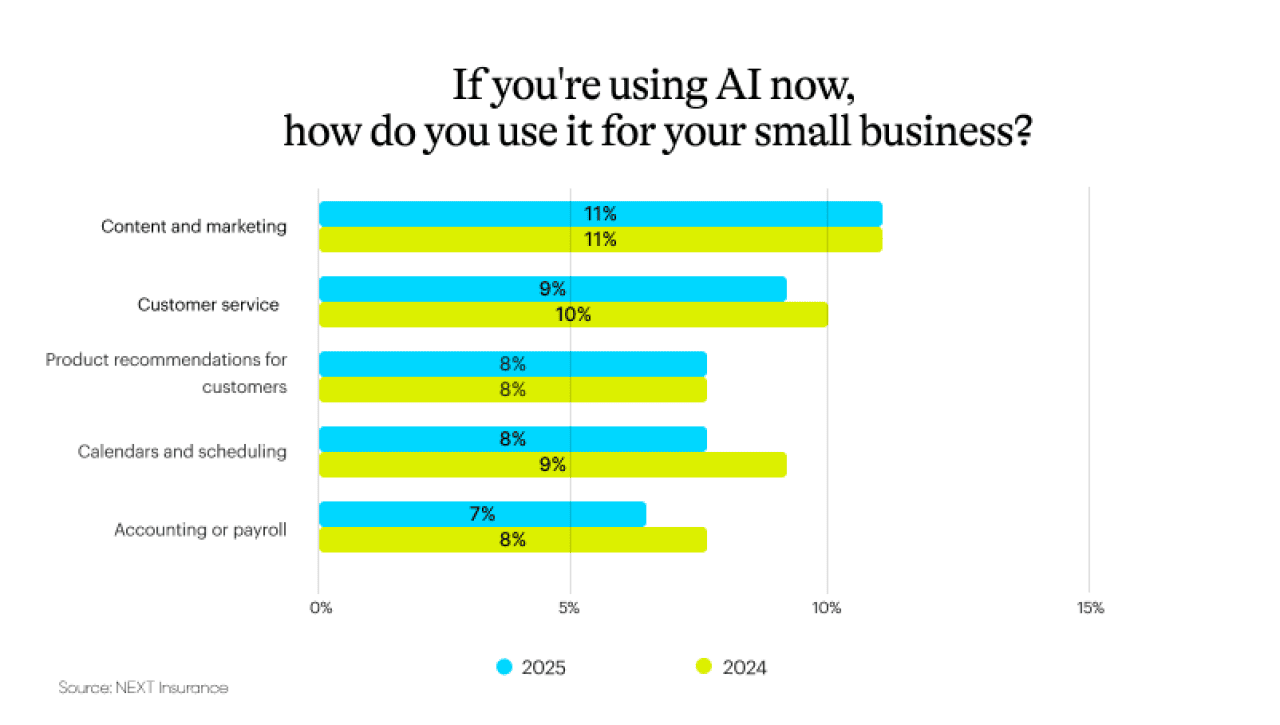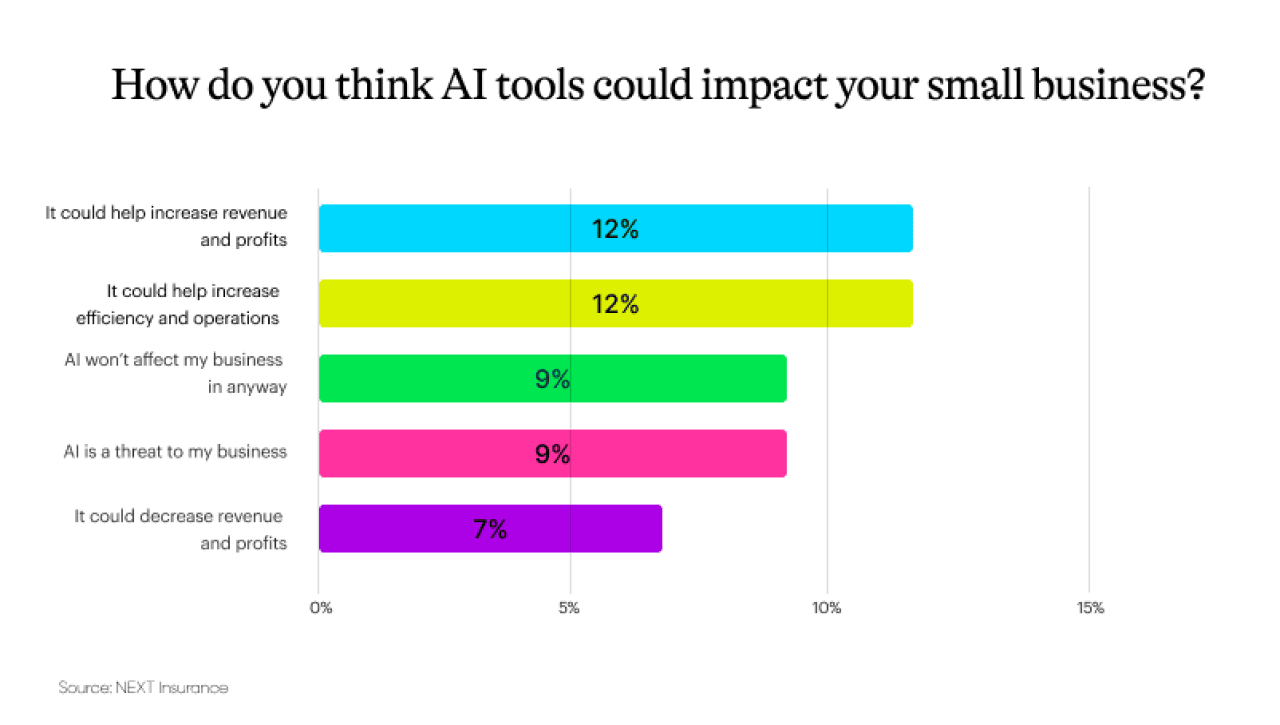Small business AI adoption declines to just 28%
Small business AI adoption declines to just 28%
Is artificial intelligence (AI) living up to the hype for small business owners? NEXT’s recent survey of AI tool adoption for small businesses shows that many are dialing back.
Independent operators rely on AI tools to be more efficient, and they’re optimistic about its impact. But many more seem to have stopped incorporating AI into their business operations since they were last surveyed in 2024. And cost and complexity seem to be the barriers keeping them out.
How many small businesses use AI?
NEXT surveyed 1,500 small business owners in April 2025 to ask about their AI usage and plans for implementation.
While 42% of small businesses reported using AI in 2024, our 2025 survey reveals a significant drop to just 28%. Why the loss of interest?
Some small business owners, like Danilo Coviello, founding partner of translation agency Espresso Translations, use AI regularly, but worry that it can add business risk. He says, “I use AI behind the scenes to streamline prep, clean terminology, and test briefs—but not to replace translators or project managers. AI can’t sense tone shifts, legal nuance or when a vague phrase could cost a client down the line. It doesn’t ask follow-up questions or spot formatting issues across languages. That’s where people still matter. Accuracy, accountability, and context still belong to humans.”

NEXT
Enthusiasm for AI adoption seems to have cooled. Last year, 27% planned to increase their business’ AI use. When asked in 2025, only 23% would “definitely consider” adding AI.
This year, just 19%—roughly 1 in 5 business owners—might add it. And 58% say they don’t plan to use AI for business at all.

NEXT
7 ways small businesses are using AI
While AI adoption seems to be down across the board, those that are using it are finding some business value. Survey data shows small businesses mostly use AI for content creation and marketing, customer service and product suggestions. Small businesses also use the technology to help streamline calendars and scheduling tasks, as well as accounting and payroll.

NEXT
Here’s a deep dive into the most common ways small businesses can put AI to work:
1. Personalized content and automated marketing
“In 2025, the key to leveraging AI in your marketing is to let it help you, not replace you, as the expert,” says marketing and AI expert Brendan Egan, founder and CEO of digital marketing agency Simple SEO Group. AI marketing tools can help small businesses create personalized content and promotions. And small business owners are clued in: According to NEXT’s survey, 11% of respondents use AI for marketing and content, making it the top use case.
Small business owners need to understand AI’s limitations and how to use it well. Says Egan, “While AI can write content, doing so may harm your site’s Google rankings. While AI can craft customer-facing emails, many companies have been caught sending something they may not want to because AI wrote it.”
And there is no shortage of tools to help you with your work. Jasper and Copy.ai can help automate copy creation. And Canva and Midjourney can assist with images and graphics.
“Currently, we are advising small businesses to leverage AI to help them with their marketing and not do it for them,” Egan says. “For example, if you’re writing a blog for SEO purposes to drive more traffic to your site, ask AI to come up with an outline and some facts for you so it is easier and faster for you to write the content. Ask AI to help you come up with creative ideas for ads in your niche or suggestions for keywords.”
2. Chatbots for immediate customer service information
NEXT’s survey found that 9% of small business owners use AI for customer service using tools like AI assistant chatbots. These smart bots can free up your time to focus on more complex customer interactions—and could even help with cross-sell or upsell opportunities.
Look for AI-powered chatbot platforms that allow you to build customized chatbots without coding skills.
3. Product recommendation tools for customized experiences
NEXT’s survey shows that 8% of business owners use AI for product recommendations to help small businesses boost sales and increase customer loyalty.
Platforms like Shopify’s AI-powered recommendations or Amazon Personalize analyze a customer’s purchase history and browsing patterns to suggest relevant products.
4. Virtual assistants for schedules and device control
Virtual assistants such as Siri, Alexa and Google Assistant aren’t just for personal tasks. They’re helpful in business, too.
NEXT’s survey shows 8% of business owners use AI to manage schedules and appointments, set reminders, answer quick queries and control smart devices at work.
5. Accounting and payroll tools
AI accounting and payroll tools can make financial management tasks easier, reduce errors and save time. 7% of small business owners already use these tools to operate their business, NEXT’s study shows.
Popular platforms such as Quickbooks, Xero, Gusto and Freshbooks already use AI technology to automate repetitive financial tasks such as invoice processing, track expenses and manage payroll.
6. Data analysis and visual reporting
AI-powered data tools like IBM Watson and Google’s Looker Studio can help businesses understand complicated data like weaknesses, opportunities, product pricing and forecasting. These tools use machine learning to spot patterns and create clear visual reports to help you make more informed business decisions.
7. Intelligent document processing for invoices, shipping, transcripts and more
AI document tools can boost efficiency by pulling data from things like invoices, receipts and purchase orders to cut down on errors from manual data entry. And if your business paperwork is suddenly digital, it can be easier to store, sort and search.
Translation company owner Coviello uses AI to, “ … generate internal docs more quickly, edit the templates given to clients and review the translation briefs.”
But AI for these tasks could introduce liability: “We once translated a supplier contract from German and the AI completely misread embedded acronyms. A human translator flagged it in two minutes, double-checked with the client, and fixed it before it caused damage. AI just moved on. In our field, that’s the problem.”
Common barriers to adopting AI for business
“Business owners generally fall into two buckets when it comes to integrating AI,” says Egan of Simple SEO Group. “Those that are using it too much, or those who are not using it at all. In our experience, there are very few businesses using AI ‘properly’.”
NEXT’s survey data reveals small business owners have mixed feelings about AI’s impact. While some owners (12%) believe AI could boost revenue, and operational efficiency (12%), many remain unsure or skeptical about its value. Some believe AI won’t affect their business in any way (9%), believe it’s a threat to their business (9%) or that it will decrease their profits (7%).

NEXT
A few obstacles that hinder AI’s adoption include:
Cost of implementation
Though AI can often help cut costs, the price of adopting AI remains a hurdle for small businesses. The Bipartisan Policy Center reports that 55% of small business owners identify cost as a reason to not use AI.
Lack of education
A 2025 survey by Service Direct found that 62% of small businesses cite a lack of understanding about AI’s benefits as a barrier to adoption. Many small business owners still view artificial intelligence tools as too complicated or meant only for larger businesses.
The challenge of data management
Data helps AI make more accurate predictions. But collecting, organizing and analyzing data can be difficult for small businesses. A Hyperscience and Harris Poll study found half of organizations don’t use AI for document processing or workflow improvements, and 77% underuse available data needed for accurate AI models.
This story was produced by NEXT and reviewed and distributed by Stacker.
![]()



